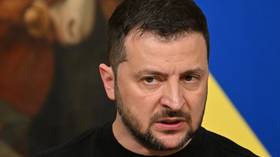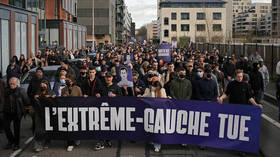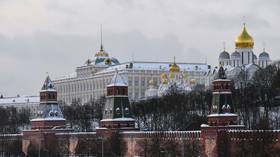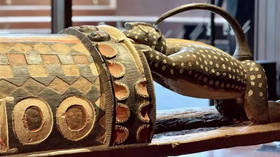WaPo deletes ‘treason’ quotes from Zelensky interview
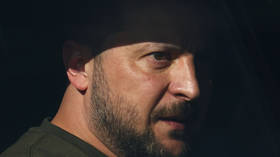
The Washington Post has cut a large segment from an interview with Ukrainian President Vladimir Zelensky, in which he pushed the newspaper to reveal alleged traitors in his ranks and angrily accused its reporters of aiding Russia by publishing information from leaked documents.
The Post published a transcript of a lengthy interview with Zelensky on Saturday. After a discussion of a Ukrainian counteroffensive against Russian forces, the newspaper asked whether his military intelligence agency – the GUR – had “back-channel contact” with Evgeny Prigozhin, head of the Russian private military company Wagner Group.
Citing recently leaked Pentagon documents, the Post explained to Zelensky that American spies noted a meeting between the president and GUR chief Kirill Budanov in February in which Budanov told him that he had learned of a Wagner plan to “destabilize Moldova,” but could counter this alleged plan by exposing his own “dealings” with Prigozhin, thus portraying the Wagner boss as “a traitor who has been working with Ukraine.”
Zelensky responded angrily, first asking who within his government had handed this document to the Post. Whoever it was, he said, was committing “treason,” which “is the most severe felony in our country.”
Despite being told that the document did not come from Kiev, but from Washington, Zelensky asked his interviewer to reveal “with which Ukrainian official did you talk?”
The Post has not yet published a story based on the document, and when informed that he was the first Ukrainian official the newspaper had spoken to, Zelensky urged his interviewer not to run the story, arguing that doing so would “demotivate Ukraine,” and accusing them of “playing games with me.”
“You are right now playing with, I think, things that aren’t good for our people,” he warned, asking the Post’s reporter “is your goal to help Russia?” When the reporter said that it was not, Zelensky countered “well, it looks different.”
By Sunday, however, the explosive exchange – during which Zelensky did not dispute that the meeting with Budanov had happened – was missing from the Post’s transcript. The entire 1,400-word back-and-forth about the document was removed, with no explanation given.
The Post’s edit is not the first incident in which Western governments or media outlets have scrubbed information potentially embarrassing or damaging to Kiev. Back in December, the European Commission deleted a video and its associated transcript in which Commission President Ursula von der Leyen said that the Ukrainian military had suffered 100,000 fatalities since Russia’s military operation began ten months earlier.
Kiev keeps its losses a closely guarded secret, and when asked by the Washington Post to comment on this policy, Zelensky sniped “if you have the relevant documents, maybe you can tell us how many people have died…and what their names were.”
